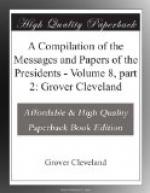R.B. HAYES.
VETO MESSAGE.
EXECUTIVE MANSION, March 1, 1879.
To the House of Representatives:
After a very careful consideration of House bill 2423, entitled “An act to restrict the immigration of Chinese to the United States,” I herewith return it to the House of Representatives, in which it originated, with my objections to its passage.
The bill, as it was sent to the Senate from the House of Representatives, was confined in its provisions to the object named in its title, which is that of “An act to restrict the immigration of Chinese to the United States.” The only means adopted to secure the proposed object was the limitation on the number of Chinese passengers which might be brought to this country by any one vessel to fifteen; and as this number was not fixed in any proportion to the size or tonnage of the vessel or by any consideration of the safety or accommodation of these passengers, the simple purpose and effect of the enactment were to repress this immigration to an extent falling but little short of its absolute exclusion.
The bill, as amended in the Senate and now presented to me, includes an independent and additional provision which aims at and in terms requires the abrogation by this Government of Articles V and VI of the treaty with China commonly called the Burlingame treaty, through the action of the Executive enjoined by this provision of the act.
The Burlingame treaty, of which the ratifications were exchanged at Peking November 23, 1869, recites as the occasion and motive of its negotiation by the two Governments that “since the conclusion of the treaty between the United States of America and the Ta Tsing Empire (China) of the 18th of June, 1858, circumstances have arisen showing the necessity of additional articles thereto,” and proceeds to an agreement as to said additional articles. These negotiations, therefore, ending by the signature of the additional articles July 28, 1868, had for their object the completion of our treaty rights and obligations toward the Government of China by the incorporation of these new articles as thenceforth parts of the principal treaty to which they are made supplemental. Upon the settled rules of interpretation applicable to such supplemental negotiations the text of the principal treaty and of these “additional articles thereto” constitute one treaty from the conclusion of the new negotiations, in all parts of equal and concurrent force and obligation between the two Governments, and to all intents and purposes as if embraced in one instrument.




